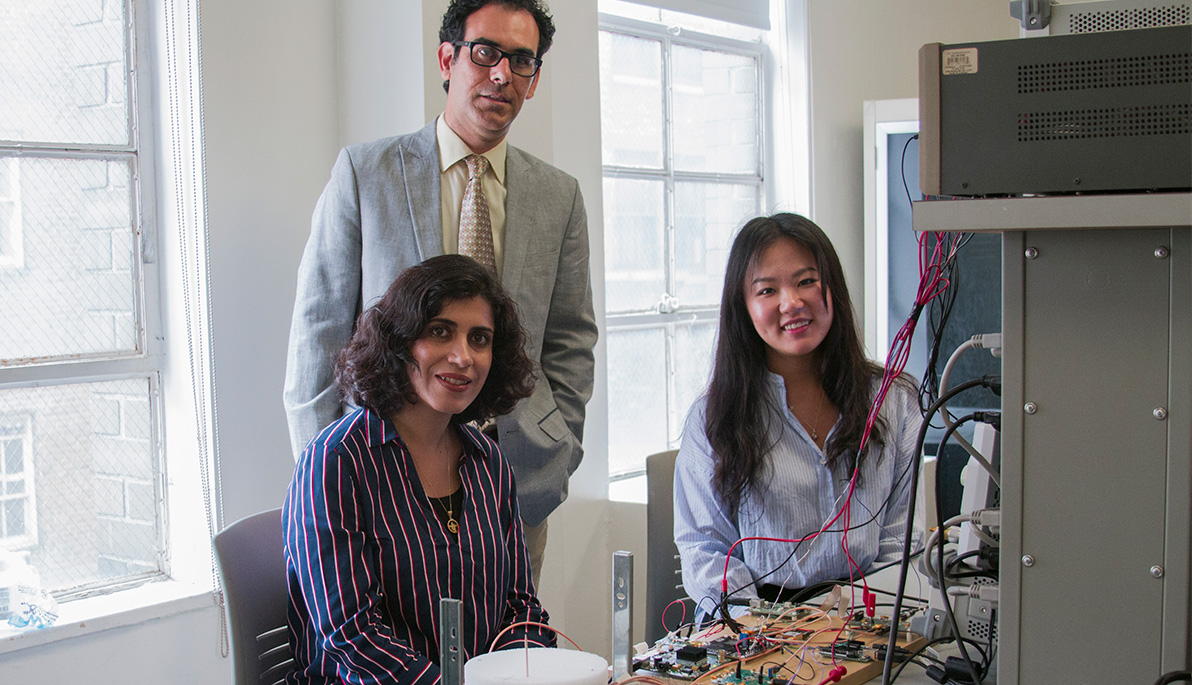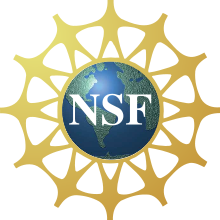News
Down the Pipe: Engineering Professors Awarded $350K NSF Grant
July 23, 2019
Pictured from left: Assistant Professors Rezah Khalaj Amineh and Maryam Ravan with research assistant Hailun Wu (M.S. ’19).
Assistant Professors of Electrical and Computer Engineering Reza Khalaj Amineh, Ph.D., and Maryam Ravan, Ph.D., won more than $350,000 to develop novel imaging techniques that will enhance testing of non-metallic cylinders such as composite oil-and-gas pipelines. The National Science Foundation (NSF) funding of the project promises to help train New York Institute of Technology students in an emerging tech field for jobs in the $136 billion U.S. oil-and-gas business, as well as in other infrastructure-dependent industries.
Pipes made of composite (nonmetallic) materials are less vulnerable to corrosion and are rapidly replacing metal pipes, especially in the oil and gas industry. However, testing these materials quickly and reliably to assure their safety presents a significant obstacle. Principal Investigator (PI) Amineh and co-PI Ravan will work with graduate and undergraduate students in NYIT College of Engineering and Computing Sciences to adapt existing holographic imaging techniques like those used in airport body scanners to carry out volumetric imaging designed specifically for cylindrical objects (pipes).
“Pipelines carry natural gas, home heating oil, and gasoline over long distances to support modern life. Water pipes too are both essential and ubiquitous. Developing technologies that help maintain the safety and integrity of pipes will support an infrastructure we all rely on and help prevent potential environmental disasters,” said Babak D. Beheshti, Ph.D., dean of the College of Engineering and Computing Sciences.
The two researchers have been working on this project since 2017 with support from internal NYIT grants, which paid for the launch of their Applied Electromagnetics Research Lab (AEMRL). Their aim with this new NSF grant is to produce a prototype that can conduct fast and reliable tests of composite materials in various applications. If successful, such technology will significantly reduce costs and increase system safety for oil and gas extraction, urban infrastructure, and other operations that rely on pipelines. In addition, the new technology can be used in a wide range of other applications such as biomedical imaging and security screening.
“We are excited about expanding NYIT’s reach to include microwave imaging. Both Dr. Ravan and I have extensive experience in non-destructive testing (NDT) and near-field microwave imaging, and the AEMRL will show our students how to develop a low-cost, compact, fast, and robust microwave NDT method,” said Amineh.
The grant will also pay for state-of-the-art equipment to perform radio frequency (RF) and microwave measurements, which will join current equipment Amineh and Ravan have secured or invented for the AEMRL. In addition, since $39,000 of the grant is set aside to employ student researchers, Amineh and Ravan are proactively seeking underrepresented minorities and women to work on the project, with the aim of diversifying the field and increasing those groups’ career options within electrical engineering. Student researchers trained with these tools will graduate with the skills required for the growing field of RF and microwave engineering.
Although the project officially starts on September 1, 2019, Amineh, Ravan and a team of NYIT graduate and undergraduate students have already started the theoretical and hardware developments. The student researchers are participating in various ways, including helping to develop the theoretical portion of the imaging process and constructing a cost-effective imaging system based on off-the-shelf components; conducting preliminary tests to understand the capabilities and limitations of the proposed imaging technology; designing an antenna to be used in the proposed imaging setup; and designing a cylindrical scanning setup that is being used in the initial tests.



_Thumb.jpg)


